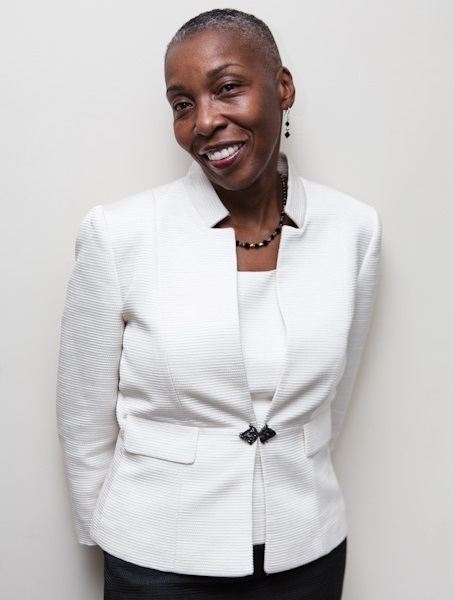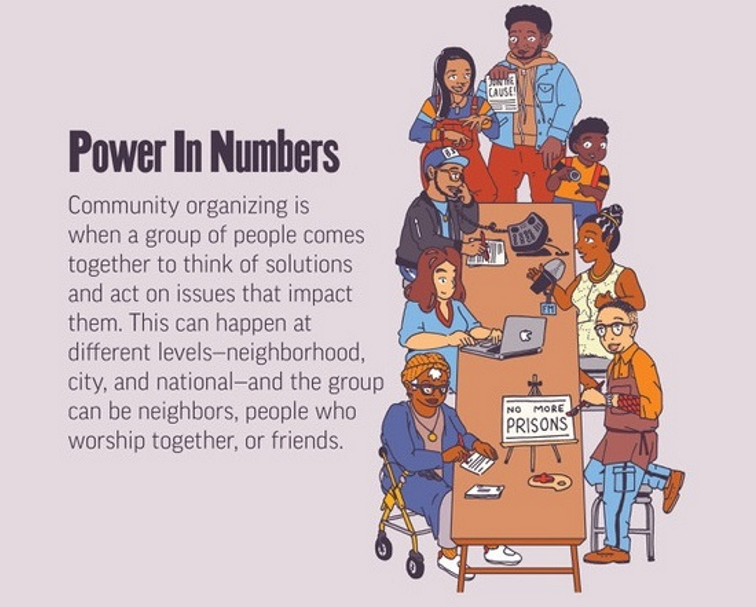NEW YORK — The Alliance of Families for Justice revealed a yearlong project on Wednesday, aimed at educating those who are incarcerated or have incarcerated family members on the importance of voting.
Over the last year, the organization partnered with The Center for Urban Pedagogy (CUP)’s Making Policy Public project to create a large foldout poster.
“When you receive our poster, you'll see that we focus on all aspects of the elimination of felony disenfranchisement so that someone's engagement with the criminal justice system should have no bearing on whether or not they get to exercise the franchise,” said Alliance Executive Director Soffiya Elijah.

Alliance of Families for Justice
Soffiya Elijah
The Alliance of Families for Justice (AFJ), which works to end human rights violations inside prisons and jails and build communities and families who are affected, worked with graphic designers Tahnee Pantig and her teammate to create the poster.
The poster’s design is intentionally different from the way anti-mass incarceration and social justice work are usually shown, Pantig said.
“Like a lot of the images that we see, representing these communities are often shown from a light that can be very dark, very oppressive, and also one-sided, and we thought it was really important to demonstrate the resiliency, the agency, the activeness of these communities, that is already there,” she said. The designers also wanted the communities to see themselves in the illustrations.
Elijah said the organization made 20,000 posters and hopes to share them across the state.
AFJ has a multilayered plan to challenge felony disenfranchisement, she said, beginning with getting family members impacted by disenfranchisement registered to vote. Parolees in New York state, through an executive order by Gov. Andrew Cuomo, can now register and vote. The final layer is to restore the right to vote for currently incarcerated people, as is the practice in Maine, Vermont and Puerto Rico.
Civic participation increasing
Hedwig Lee, a social demographer from Washington University in St. Louis, led a panel discussion after Elijah unveiled the poster. Lee’s research focuses on the family and children of the incarcerated.
People who have incarcerated family members do experience lower voting rates, she said. They need time, energy and resources to be able to vote, which is why it’s sometimes harder for them to do so.
 “Our research also shows that the ways in which the prison system also burdens families, it can cause individuals to lose faith in the government and the role of the government in actually changing and helping communities,” Lee said.
“Our research also shows that the ways in which the prison system also burdens families, it can cause individuals to lose faith in the government and the role of the government in actually changing and helping communities,” Lee said.
New research in political science shows increasing rates of civic participation by people who have been impacted by incarceration in the form of protesting and other actions other than voting, she said.
Jolene Russ, whose husband has been incarcerated for 20 years, said she didn’t vote in the past as a way to stand in solidarity with her partner, but that for the last decade they had been voting together.
They now talk about the candidates daily. “So now I kind of like vote on his behalf almost ...” she said. “So we're like voting together, but it would be nice for him to have a vote.”
Panelists also discussed bringing civics back to the classroom and felony disenfranchisement, which prevents those with a conviction for a serious offense from voting.
Elijah announced that AFJ and families had seen a small victory earlier in the day against the Department of Corrections and Community Supervision (DOCCS).
In March, DOCCS suspended all prison visits because of the coronavirus. In May, DOCCS said visits would resume in early August with new restrictions, including limiting visits to two hours, no touching, advance registration for visitors, closing the children’s play area, closing the family reunification program and not processing applications for marriage licenses.
Family members across New York state mobilized and worked with AFJ on Thursday evenings to make a list of concerns and a strategy to push back.
“We last Thursday had a successful car caravan protest in Albany where we drove around and made a lot of noise and went around the headquarters for DOCCS and drove through impacted communities,” Elijah said.
The group also emailed elected officials and met with politicians, who wrote a letter in support of the group’s concerns to Cuomo. On Tuesday, they announced an economic boycott and a protest in front of the governor's office in New York City for Aug. 5. A day after the announcement, DOCCS pulled back the restrictions.
Now, visits will not be limited to two hours and people can touch their loved ones, but only at the beginning of the visit. Also, up to three people and a child under 5 can now visit.
Elijah acknowledged that there’s more to be done and that Wednesday’s victory was only a partial one.
“The organizing and the mobilizing around these issues is exactly what the purpose of the work that AFJ does and this poster, there’s a move towards the victory that we ultimately want to have,” she said.
